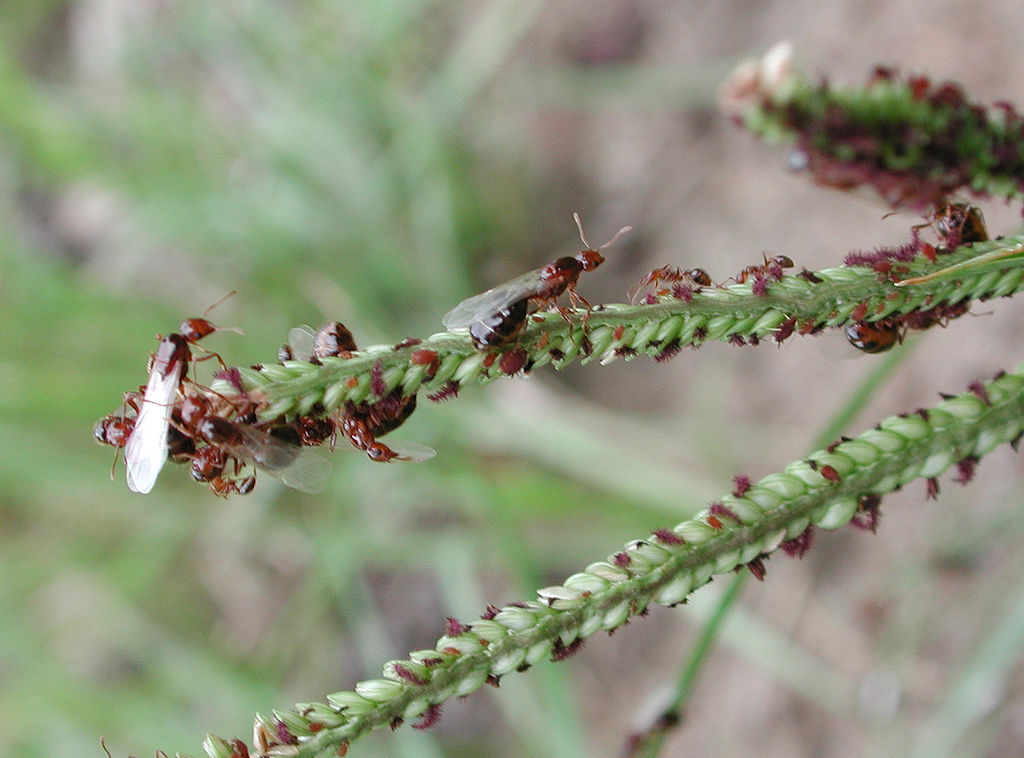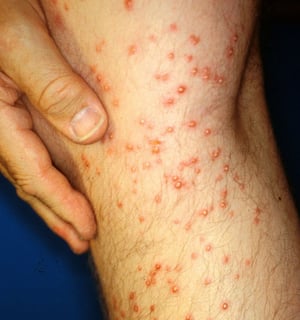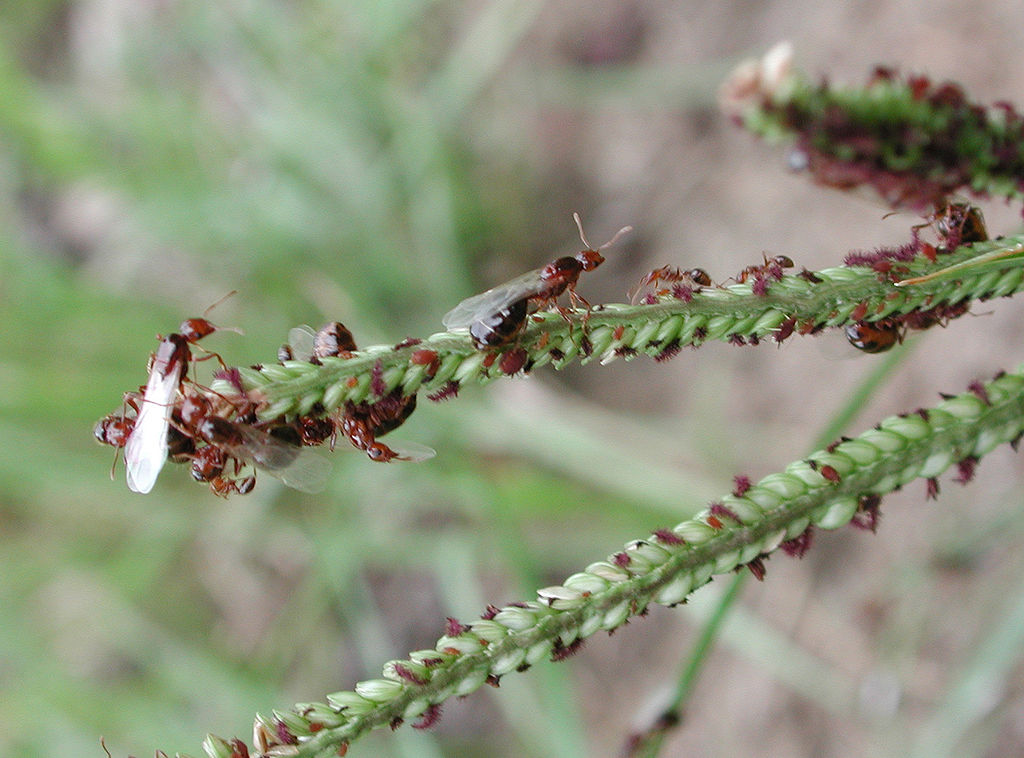
Nothing quite disrupts some enjoyable time in your Tennessee or Mississippi yard like an invasion of fire ants. They not only can suddenly swarm but they can be quite aggressive and produce a painful sting. Fire ant stings produce at least some pain for most people, but for those who are allergic, they can be incredibly dangerous, too.
Whether you know you’ve had a fire ant problem on your property in the Memphis, TN or Olive Branch, MS area or you just want to make sure to avoid them, you might be looking for more information on these unwanted pests as well as how to get rid of them.
That’s why we’ve rounded up some important facts along with details on effective fire ant control.
 As their name suggests, fire ants are a dark reddish-brown color. Males are black but are rarely seen except during mating swarms or shortly after, when they die. However, many say that fire ants actually get their name due to the fire-like burning experienced by one of their stings. The sting continues alkaloid venom, which is highly irritating to humans and can cause red bumps and white pustules.
As their name suggests, fire ants are a dark reddish-brown color. Males are black but are rarely seen except during mating swarms or shortly after, when they die. However, many say that fire ants actually get their name due to the fire-like burning experienced by one of their stings. The sting continues alkaloid venom, which is highly irritating to humans and can cause red bumps and white pustules.
What’s alarming is that fire ants are known to attack in large numbers. If you are perceived as a threat to a fire ant colony, you could experience multiple stings. A colony may contain as many as 100,000 to 500,000 insects!
If you experience a fire ant sting reaction that includes sweating, nausea, excessive itching, or difficulty breathing you may be allergic and should seek medical attention immediately. Just like bees or other stinging insects, a certain percentage of the population is allergic to fire ants. Unfortunately, you won’t know if you’re allergic until after being stung, so be alert for these symptoms.
You should also think about protecting your four-legged family members from fire ants. Because family pets often spend a lot of time outside, their likelihood of being stung is higher. Young animals, caged animals, and elderly animals with mobility issues are at an even higher risk of fire ant attack.
It’s also important to recognize that dog food can attract fire ants. Once they’re alerted to the source of food, fire ants often swarm a food bowl, making it dangerous for your pet to eat.
Because fire ants favor warm and sunny conditions, they can thrive in Tennessee and Northern Mississippi. They tend to avoid shady areas, such as woods. If you have a sunny lawn, they may decide to take up residence.
Fire ants build mounds for their colonies. Undisturbed mounds, such as those in open fields, have been known to reach as high as 18 inches. These colonies may contain several hundred thousand fire ants and at least one queen. Colonies can grow large enough to extend across several properties, making control difficult.
Stepping on a mound is one of the worst ways to get stung and it’s important to always be careful where you’re walking if you’re dealing with a fire ant problem.
Because fire ants are omnivorous, they will feed on both animal and vegetable sources of food. The typical fire ant’s diet consists of outdoor pests like ticks, spider, and earthworms, as well as honeydew and seeds. To search for food, foraging worker ants leave the nest or mound and wander randomly. Upon discovery of a food source, they head straight back to the colony.

Though they may have food preferences, because they are opportunistic pests, fire ants will generally eat whatever is around. That includes food that you may have accidentally left out or dropped in the yard. Be aware that leaving behind food in the yard can become a major fire ant attraction.
Unfortunately, fire ants can be difficult to control. For one, their colonies often tend to be quite large and extend underground for a great distance. Fire ants also tend to be found in large numbers. On top of all that, colonies often have more than one queen so they can recover even after a queen or two has been killed.
If you suspect you have a fire ant problem or are just being proactive about preventing one, it’s best to consult with a professional. A successful fire ant control program will include bait that is brought back to the colony. Targeting fire ants underground in large number is the most effective approach.
 Of the various pests lurking about your yard, we understand that fire ants are among the most dreaded. Nobody likes stinging insects and getting attacked by these nasty pests can quickly ruin a day of fun in the yard.
Of the various pests lurking about your yard, we understand that fire ants are among the most dreaded. Nobody likes stinging insects and getting attacked by these nasty pests can quickly ruin a day of fun in the yard.
Fortunately, there’s a way to take back control. With the right approach to fire ant control, you can ensure these pests are taken care of before ever getting the chance to sting a family member of pet. Instead of having to worry about what’s lurking within your grass, you can get back to simply enjoying time outside.
Ready to say goodbye to fire ant worries at your Tennessee or Northern Mississippi home? Talk to a lawn care expert about adding fire ant control to one of our 3 lawn care program options, and become the master of your lawn.
Image sources: fire ants on plant, fire ant stings
Michael Hatcher is Founder / Chairman of Michael Hatcher & Associates.
These Stories on Insects & Pests
8255 Center Hill Rd
Olive Branch, MS 38654
8164 MS-178
Olive Branch, MS 38654
Phone: (901) 445-9336
Fax: (901) 853-7353
Copyright © Master Lawn | All Rights Reserved.